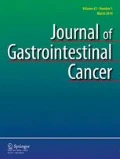Abstract
Purpose
To asseess whether the mevalonate pathway can be targeted in managing patients with esophageal cancer.
Methods
This a narrative review of peer-revieweed publications indexed in MedLine PubMed. The search was conducted by using "Esophageal cancer", "Mevalonate pahtway", "Statins", and "Translational research."
Results
The mevalonate pathway is an important metabolic pathway that is involved in various cellular functions. Its downstream products are essential for cell-signaling, cell membrane integrity, protein synthesis, and cellular respiration. Statins, a class of medications that are best known as lipid-lowering drugs, inhibit the rate-limiting enzyme of this pathway. Many studies have shown that a variety of cancerous cells have a dysregulated mevalonate pathway. Esophageal cancer is a malignancy that has a poor prognosis, which is mainly due to patients presenting once the cancer is in the advances stages. Chemotherapy has been the mainstay for treating esophageal cancer. However, these agents are not consistently effective and fail to differentiate between the different subtypes of esophageal cancers. Identifying other classes of drugs which could possess anti esophageal cancer properties is appealing.
Conclusion
There is a growing body of literature that has shown the anti-cancer properties of statins in the setting of various malignancies. Herein, we summarize the current literature as it pertains to how the mevalonate pathway can be targeted by statins for potentially treating esophageal cancer.
References
Fatehi Hassanabad A, Chehade R, Breadner D, Raphael J. Esophageal carcinoma: towards targeted therapies. Cell Oncol. 2020;43(2):195–209.
Pennathur A, Gibson MK, Jobe BA, Luketich JD. Oesophageal carcinoma. Lancet. 2013;381:400–12.
Zhang Y. Epidemiology of esophageal cancer. World J Gastroenterol. 2013;19(34):5598–606.
Napier KJ, Scheerer M, Misra S. Esophageal cancer: a review of epidemiology, pathogenesis, staging workup and treatment modalities. World Journal of Gastrointestinal Oncology. 2014;6(5):112–20.
Fatehi Hassanabad A, Wong JVS. Molecular determinants of statin-sensitivity. Am J Clin Oncol. 2020;43(3):160–162.
Fatehi Hassanabad A. Current perspectives on statins as potential anti-cancer therapeutics: clinical outcomes and underlying molecular mechanisms. Translational Lung Cancer Research. 2019;8(5):692–99.
Thomas T, Loke Y, Beales IL. Systematic review and meta-analysis: use of statins is associated with a reduced incidence of oesophageal adenocarcinoma. J Gastrointest Cancer. 2018;49(4):442–54.
Lai S, Liao K, Lai H, Muo C, Sung F. Atorvastatin correlates with decreased risk of esophageal cancer: a population-based case-control study from Taiwan. Libyan Journal of Medicine. 2012;7(1).
Alexandre L, Clark AB, Bhutta HY, Holt S, Lewis MP, Hart AR. Statin use is associated with reduced risk of histologic subtypes of esophageal cancer: a nested case-control analysis. Gastroenterology. 2014;146:661–8.
Alexandre L, Clark AB, Bhutta HY, Chan SS, Lewis MP, Hart AR. Association between statin use after diagnosis of esophageal cancer and survival: a population-based cohort study. Gastroenterology. 2016;150:854–65.
Singh S, Singh AG, Singh PP, Murad MH, Iyer PG. Statins are associated with reduced risk of esophageal cancer, particularly in patients with Barrett’s esophagus: a systematic review and meta-analysis. Clin Gastroenterol Hepatol. 2013;11:620–9.
Chen Y, Li L, Zhang J, Tang D, Wei J, Zhuang Z. Simvastatin, but not pravastatin, inhibits the proliferation of esophageal adenocarcinoma and squamous cell carcinoma cells: a cell-molecular study. Lipids Health Dis. 2018;17.
Ye F, Zhang G, Guan B, Xu X. Suppression of esophageal cancer cell growth using curcumin, (-)-epigallocatechin-3-gallate and lovastatin. World J Gastroenterol. 2012;18(2):126–35.
Beales IL, Hensley A, Loke Y. Reduced esophageal cancer incidence in statin users, particularly with cyclo-oxygenase inhibition. World J Gastrointest Pharmacol Ther. 2013;4(3):69–79.
Author information
Authors and Affiliations
Corresponding author
Ethics declarations
Ethics
No cell lines or human tissues were used for this manuscript.
Conflict of Interest
The authors declare no competing interests.
Additional information
Publisher's Note
Springer Nature remains neutral with regard to jurisdictional claims in published maps and institutional affiliations.
Rights and permissions
About this article
Cite this article
Wong, J.V.S., Fatehi Hassanabad, A. Targeting the Mevalonate Pathway for Treating Esophageal Cancer. J Gastrointest Canc 52, 819–821 (2021). https://doi.org/10.1007/s12029-021-00644-8
Accepted:
Published:
Issue Date:
DOI: https://doi.org/10.1007/s12029-021-00644-8

